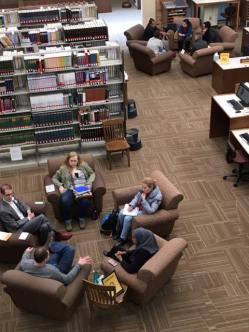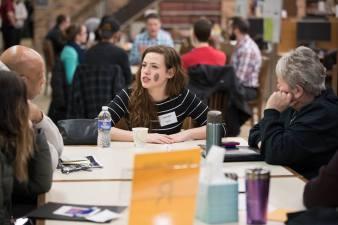Many of the greatest problems facing our world today are caused or exacerbated by stereotypes and prejudices individuals harbor across group lines. It can be easy to believe that the problem is “out there,” perhaps on a different continent where conflict is more obvious. However, the election of President Trump has revealed – to the surprise of many – just how divided Americans are across political, geographical, class, racial, and religious lines. Individuals increasingly seem to be asking “what can we do?” to encourage effective relations across groups typically segregated in our midst.
Considerable research on the science of hatred shows that contact and dialog across members of different groups is one of the best ways to promote the shared sense of humanity so important to reducing stereotypes and prejudices we all have. However, this raises another question: how can we have meaningful interchange across groups in our normally segregated world?
Responding to the brutal stabbing of a mutual friend in Copenhagen, five teenagers started a movement called “Stop the Violence” in 1993. By 2000, this group had over 30,000 members and was increasingly known for widespread activism across Denmark. That year, Leif Stof, Director of the Roskilde Festival, approached leaders to design an innovative event that would garner widespread attention in challenging stereotypes and prejudice across group lines. This led to the creation of what is now termed “The Human Library.” Still headquartered in Denmark, this activity now has spread to over 70 countries, including the United States, where it is governed by its Chicago Chapter.

Human Library Event, Normandale Community College, February 28th, 2017
A Human Library consists of participant “Readers” who can “check out” and “read” volunteer human “Books.” After the volunteer presents a brief version of their life story, participants and volunteers engage in discussion that arises from that story. This format provides a “safe space” that allows individuals to explore barriers that separate, as well as similarities that connect.
One of the advantages of The Human Library is that it can be adapted to suit many kinds of purposes. A small, rural community could organize a Human Library to bring diverse perspectives typically more represented in the city, and vice versa. Religious groups could host a Human Library to better understand members of different faiths or no faith at all. In a Human Library recently organized at my college, “Books” included a cancer survivor, gay Pastor, person with a physical disability, Syrian refugee, and veteran who suffered from PTSD.

Human Library Event, Normandale Community College, February 28th, 2017
Bosnian-born theologian Miroslav Volf has concluded that “it may not be too much to claim that the future of our world will depend on how we deal with identity and difference.” The Human Library is one practical strategy for helping individuals to be better prepared to respond to such difference, something that our increasingly diverse world demands if we are to achieve peace.
Advertisements